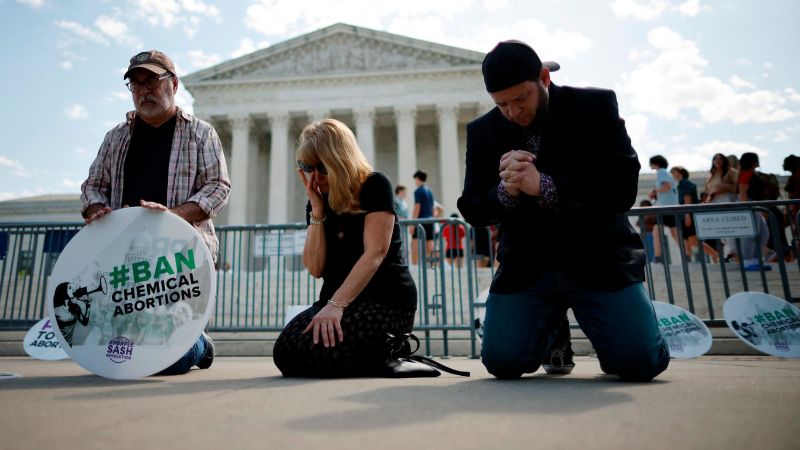The Supreme Court said Wednesday it will consider whether to restrict access to a widely used abortion drug — even in states where the procedure is still allowed.
The case concerns the drug mifepristone that — when coupled with another drug — is one of the most common abortion methods in the United States.
The decision means the conservative-leaning court will again wade into the abortion debate after overturning Roe v. Wade last year, altering the landscape of abortion rights nationwide and triggering more than half the states to outlaw or severely restrict the procedure.



I believe that all people have the right to bodily autonomy, and if one is married then family autonomy does make sense as well. I do not believe any legislature has a legitimate reason to make healthcare decisions for any person or family.
There’s no redeemable legal right to “bodily autonomy.” Abortion was protected by the Constitution only under an implied privacy rubric. I understand what you’re saying and I agree wholeheartedly, it’s just the law doesn’t recognize mere bodily autonomy as something that’s protected. The protections for this stuff are rooted in privacy, due process.
I get flamed everytime I bring this up, but the sovereign has a right to perpetuate itself. In other words, part of the constitutional compact–the trade off between the people the new federation, the consent of the people to give away certain natural law freedoms in exchange for our great experiment in government by the people–is that the federation has a mandate to preserve it’s continued existence.
So, hypothetically, think of the plot of the movie Outbreak: a viral pathogen so deadly and so out of control that the entire country might be deceased within weeks if the spread is not halted, and so the government deploys strategic bombing against its own cities. The Supreme Court has always upheld reasonable, good faith vaccine mandates, quarantines, military drafts, limitations on habeas corpus, travel restrictions, and many many varieties of forced medical procedures, not to mention all the regulatory action on food and drugs, that are certainly less intrusive but potentially no less matter of life and death, such as bans on experimental medication and procedures.
Are not seatbelts and drunk driving laws restrictions on bodily autonomy? I mentioned prison and habeas corpus, but the whole thing there, and especially the Fourth and Eighth Amendments pretty obviously limits bodily autonomy, you know, if you get sentenced to prison, aside from habeas corpus, the right to bodily autonomy is massively limited and virtually everyone is fine with that.
All I’m saying is that bodily autonomy is a crap argument, it’s obviously not something that’s legally sacrosanct, and it’s obviously something that yields to the most mundane of reasons, such as the little kid, seven or eleven years old or something, that was placed under custodial arrest for public urination. I mean if the law allows your right to bodily autonomy to break for public urination, do you ever have a redeemable right of bodily autonomy? How many people lost their bodily autonomy for decades for some weed?
Well in my view, seatbelts and drunk driving laws are mandates for helping protect and safeguard bodily autonomy (of others if not yourself). And yes federal laws do compromise bodily autonomy, but such measures have to be in place when someone’s autonomy threatens the safety of other people.
This is just my opinion, but I think we do have an inalienable right to bodily autonomy. But in a world with other people around we can’t truly have total autonomy all the time. So I get the point you’re making in that regard. The law must inhibit behaviors that are indecent or harmful to other people.
However in the case of abortion rights, I think the current laws restrict access to necessary healthcare, and one’s healthcare choices are the most autonomous of all personal choices. No one can force you to go seek medical care, but by the same token no one should be passing laws to make it impossible to seek such care.
You don’t think the right is inalienable if you’ve just listed two situations in which bodily autonomy is justifiably alienated, see?
You can absolutely forced to be vaccinated or quarantined by the government. No country I’m aware of has laws to the contrary. Even like, if you get hurt at work, the government can require you to have surgery if doing so would regain your functional capscity, contingent on future wage loss or medical treatment benefits.
Sounds good to me.